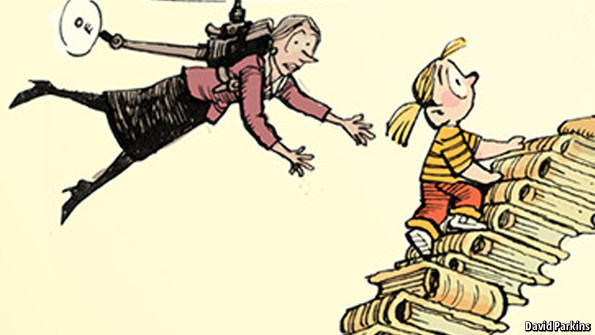For those of us with young children.
Via The Economist
Helicopter parents
Relax, your kids will be fine
Middle-class parents should give their children more freedom

IN 1693 the philosopher John Locke warned that children should not be
given too much “unwholesome fruit” to eat. Three centuries later,
misguided ideas about child-rearing are still rife. Many parents fret
that their offspring will die unless ceaselessly watched. In America the
law can be equally paranoid. In South Carolina this month Debra Harrell
was jailed for letting her nine-year-old daughter play in a park
unsupervised. The child, who had a mobile phone and had not been harmed
in any way, was briefly taken into custody of the social services.
Ms Harrell’s draconian punishment reflects the rich world’s angst
about parenting. By most objective measures, modern parents are far more
conscientious than previous generations. Since 1965 labour-saving
devices such as washing machines and ready meals have freed eight hours a
week for the average American couple, but slightly more than all of
that time has been swallowed up by childcare. Dads are far more hands-on
than their fathers were, and working mothers spend more time nurturing
their sprogs than the housewives of the 1960s did. This works for both
sides: children need love and stimulation; and for the parents, reading
to a child or playing ball games in the garden is more fulfilling than
washing dishes.
There are two blots in this picture, connected to class. One is at
the lower end. Even if poor parents spend more time with their children
than they once did, they spend less than rich parents do—and they
struggle to provide enough support, especially in the crucial early
years (see article).
America is a laggard here; its government spends abundantly on
school-age kids but much less than other rich countries on the first two
or three years of life. As this newspaper has pointed out before, if
America did more to help poor parents with young children, it would
yield huge returns.
The second problem, less easy to prove, occurs at the other end of the income scale, and may even apply to otherwise rational Economist readers: well-educated, rich parents try to do too much (see article).
Safety is part of it: they fear that if they are not constantly
vigilant their children may break their necks or eat a cupcake that has
fallen on the floor. Over-coaching is another symptom. Parents fear that
unless they drive their offspring to Mandarin classes, violin lessons
and fencing practice six times a week, they will not get into the right
university. The streets of Palo Alto and Chelsea are clogged with
people-carriers hauling children from one educational event to another.
The fear about safety is the least rational. Despite the impression
you get from watching crime dramas, children in rich countries are
mind-bogglingly safe, so long as they look both ways before crossing the
road. Kids in the 1950s—that golden era so often evoked by conservative
politicians—were in fact five times likelier to die before the age of
five. Yet their parents thought nothing of letting them roam free. In
those days, most American children walked or biked to school; now barely
10% do, prevented by jittery parents. Children learn how to handle
risks by taking a few, such as climbing trees or taking the train, even
if that means scraped knees and seeing the occasional weirdo. Freedom is
exhilarating. It also fosters self-reliance.
Get out of that helicopter
The other popular parental fear—that your children might not get into
an Ivy League college—is more rational. Academic success matters more
than ever before. But beyond a certain point, parenting makes less
difference than many parents imagine. Studies in Minnesota and Sweden,
for example, found that identical twins grew up equally intelligent
whether they were raised together or apart. A study in Colorado found
that children adopted and raised by brainy parents ended up no brainier
than those adopted by average parents. Genes appear to matter more than
upbringing in the jobs market, too. In a big study of Korean children
adopted in America, those raised by the richest families grew up to earn
no more than those adopted by the poorest families.
This does not mean that parenting is irrelevant. The families who
adopt children are carefully screened, so they tend to be warm, capable
and middle-class. But the twin and adoption studies indicate that any
child given a loving home and adequate stimulation is likely to fulfil
her potential. Put another way, better-off parents can afford to relax a
bit. Your kids will be fine if you hover over them less and let them
frolic in the sun from time to time. You may be happier, too, if you
spend the extra time indulging your own hobbies—or sleeping. And if you
are less stressed, your children will appreciate it, even if you still
make them eat their fruit and vegetables.






